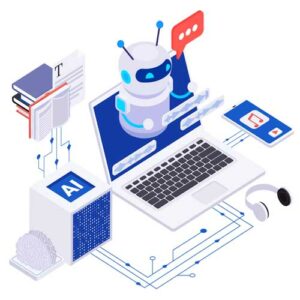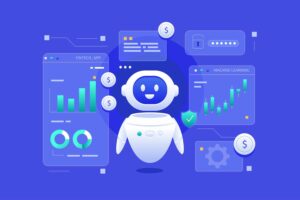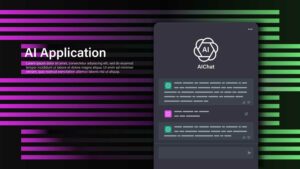The Role of AI in Modern Music
Introduction
The integration of artificial intelligence (AI) in the music industry is a striking development, marking the beginning of a new era in musical creativity and production. This blend of AI and music extends beyond mere experimentation, becoming a dynamic force that’s reshaping how music is composed, produced, and experienced by audiences worldwide.

- AI in Composition
AIVA and IBM’s Watson Beat are revolutionising music composition. AIVA, for instance, has been used to compose music for films and games, showcasing its creative capabilities.
- AI in Production:
Tools like LANDR and Amper Music use AI for music production, streamlining the process with automated mastering and soundtrack creation, making professional-quality sound more accessible.
- AI in Music Experience:
Apps like Spotify leverage AI for personalised music recommendations, enhancing the listening experience by connecting audiences with tailored playlists.
- Examples of AI-Generated Songs:
Sony’s AI program Flow Machines created “Daddy’s Car,” a song in the style of The Beatles. Various AI-generated tracks in different genres can be found on platforms like YouTube, demonstrating AI’s potential in music creation.
The Rise of AI in Music Composition
Imagine an orchestra where AI acts as a limitless instrument, capable of producing a vast spectrum of sounds and styles. AI in music composition uses advanced algorithms to generate original music, learning from a diverse range of musical genres and structures. This innovation allows for the creation of pieces that are both novel and reminiscent of human creativity. It’s a fusion of algorithmic complexity with the nuanced artistry of music, leading to compositions that were once thought impossible.
AI’s Impact on Music Production
In the realm of music production, AI is revolutionising traditional methods. Using tools like Emergent Drums and Scaler 2, AI aids in mixing, mastering, and even creating bespoke musical experiences for listeners. It’s enhancing audio tracks, optimising sound quality, and even tailoring music to individual preferences. This evolution in music production is changing the role of producers, offering them a range of AI-driven tools to refine and redefine their craft.
Exploring Generative AI and Music Creation
The interplay between generative AI and music is a testament to the extraordinary capabilities of this technology. AI systems can now produce music that spans a variety of genres and styles, providing artists and producers with a new domain for experimentation and expression. The essence of this technology lies not just in its computational power but also in its ability to understand and replicate the emotional depth that is fundamental to music.

Revolutionising Music Streaming with AI
Artificial intelligence is radically transforming music streaming services, reshaping how we interact with our favourite tunes. By leveraging sophisticated AI algorithms, these services are now able to analyse user listening habits and preferences in unprecedented detail. This data is then used to curate highly personalised playlists, ensuring that every listener’s experience is uniquely tailored to their tastes. It’s a game-changer, not just for how we discover and enjoy music but also for how artists connect with their audience. This technology provides a powerful platform for both established and emerging artists, helping them reach listeners who are most likely to appreciate their work. The ability of AI to predict and suggest new music based on user behavior is also creating a more dynamic and responsive music distribution and promotion landscape, where discovery and access to new music are more intuitive than ever.
AI Music Tools: Expanding Creative Horizons
The advent of AI in music production has led to the development of a plethora of innovative tools that are opening up new creative avenues for artists and producers. BandLab’s SongStarter, for example, is an AI-driven tool that kickstarts the songwriting process by generating unique music snippets based on user input, providing a source of inspiration for musicians facing writer’s block. Similarly, AIVA (Artificial Intelligence Virtual Artist) is an advanced AI music composition software that assists in creating complex and beautiful compositions. These tools are not just about automating the creative process; they are about enhancing it. They offer artists and producers the opportunity to experiment with new sounds, structures, and styles, pushing the boundaries of traditional music creation. By harnessing AI, musicians can explore new realms of creativity, from generating initial musical ideas to developing full-fledged compositions, making these tools invaluable assets in the modern music production toolkit.
Harnessing AI for Efficient Music Production
Beyond composition, AI is also making strides in streamlining music production processes. AI mastering tools like LANDR and automatic mixing systems such as Mix Monolith are changing the landscape of music production, making it more accessible and efficient. These advancements are particularly beneficial for independent artists and producers, allowing them to achieve professional-quality sound without the need for expensive studio resources.
ChatGPT: A New Tool for Musicians
ChatGPT, an AI tool by OpenAI, is emerging as a versatile assistant for musicians. It can help with various tasks, from generating social media content to providing creative prompts and strategy advice. This application of AI reduces the time artists spend on administrative tasks, freeing them up to focus on their primary passion: creating music.

Navigating Challenges and Ethical Issue
The integration of AI in music, while innovative, comes with its challenges. One significant concern is preserving the authenticity and emotional depth in AI-generated music. As AI learns from existing compositions, there’s a risk of inadvertently creating works that resemble established pieces, potentially leading to copyright infringement issues. For artists, ensuring that AI tools align with their artistic vision and do not compromise their original intentions is crucial. AI should amplify, not overshadow, human creativity.
There’s also a debate about how AI-generated music affects royalties and the overall value of music. If AI compositions flood the market without proper attribution and licensing, it could undercut the financial model that supports human creators. Navigating these legal and ethical waters is vital for maintaining a balance between embracing AI’s potential and upholding the rights and interests of human artists.
Conclusion
AI’s role in the music industry is undeniably transformative and continues to evolve. From AI-driven composition and production to its impact on music streaming and discovery, the possibilities are vast and exciting. As we embrace this new era, the synergy between AI and human creativity in music promises to enrich our musical experience, making it more diverse, accessible, and innovative.





